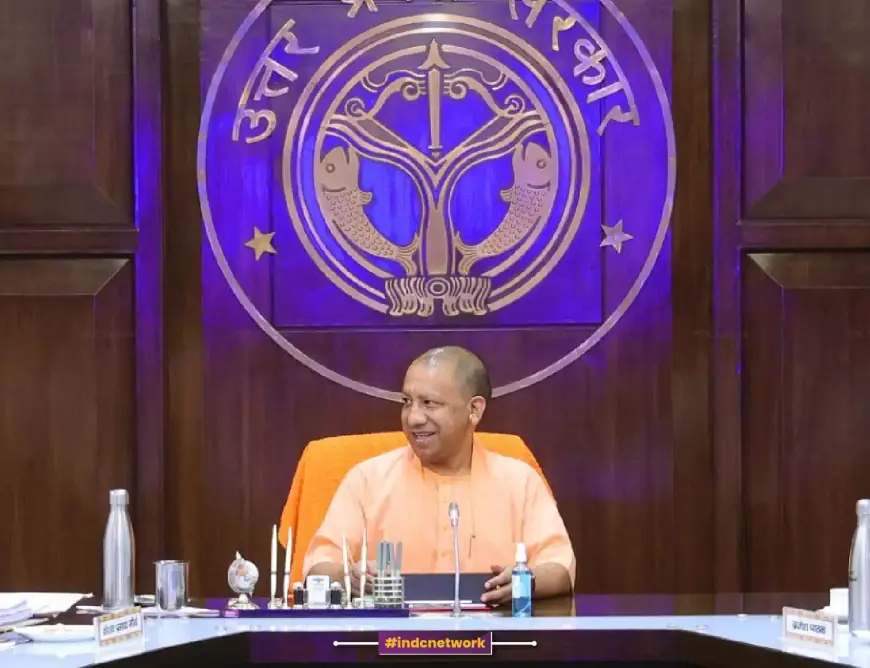Yogi Government's Bold Move: UP to Choose its Own DGP, Ending Central Oversight in Appointment
The Uttar Pradesh government has introduced new guidelines for appointing the state's Director General of Police (DGP), marking a shift from central oversight. The Yogi Adityanath cabinet has approved a process where a state-led committee, headed by a retired High Court judge, will select the DGP without the need for Union Public Service Commission (UPSC) involvement. The move aims to ensure officers aligned with state standards are appointed to key law and order roles. This new system provides a two-year tenure for selected DGPs, ensuring stability in the top police position.

INDC Network : Uttar Pradesh : Yogi Government's Bold Move: UP to Choose its Own DGP, Ending Central Oversight in Appointment
A New Era in UP: State Takes Control Over DGP Appointment
In a decisive step toward independent governance in Uttar Pradesh (UP), the Yogi Adityanath administration has introduced a significant change to the process of appointing the state’s Director General of Police (DGP). For years, the appointment of the DGP in UP was a matter of contention between the central government and the UP administration, with oversight from the Union Public Service Commission (UPSC) and the Department of Personnel and Training (DoPT). However, under this new system, the power to select the DGP has been transferred entirely to a state committee.
This reformed process has been sanctioned by the state cabinet, marking a turning point for UP's administrative autonomy. Moving forward, a state-led committee—chaired by a retired High Court judge—will be responsible for the appointment. Other committee members include the Chief Secretary of Uttar Pradesh, a representative from UPSC, a chairman or representative from the Uttar Pradesh Public Service Commission, the Principal Secretary (Home), and a retired DGP with experience in UP Police. This shift signals a departure from the previous system, where the central government’s approval was required and UPSC played a leading role in the selection.
The Road to Reform: Addressing Past Challenges with New Appointment Rules
The journey toward this reform has been fraught with challenges. Under the former system, the UP government submitted a list of all eligible Director General (DG) officers to UPSC, which then shortlisted three senior officers with at least two years remaining in service. However, the standards set by UPSC, primarily focusing on seniority, often clashed with the UP government's preference for officers deemed best suited to implement its policies and law-and-order objectives.
This conflict became particularly evident in 2021 with the appointment of Mukul Goyal as DGP. Despite central approval, Goyal was dismissed within ten months due to alleged "lax supervision," according to the state’s evaluation. Following his removal, a series of acting DGPs held the position, including DS Chauhan, RK Vishwakarma, and Vijay Kumar, none of whom had sufficient tenure for a permanent role. When Vijay Kumar retired, Prashant Kumar was appointed as acting DGP in January 2024. The repeated reliance on acting DGPs led to instability, and UP officials grew increasingly vocal about the need for a more efficient and stable appointment process that aligned with their governance requirements.
The Adityanath government, driven by a desire for more autonomy and alignment with local law-and-order priorities, proposed this change. With the new rule, the UP government no longer needs to send a panel to UPSC for approval, effectively bypassing central oversight. The committee’s role will be to vet and appoint the DGP based on a holistic assessment, not solely on seniority.
Looking Ahead: Ensuring Stability and Efficiency with a New DGP Selection Process
With this new system, Uttar Pradesh aims to create a more consistent leadership structure within its police force. One of the notable features of the revised approach is a fixed two-year tenure for appointed DGPs, ensuring continuity in leadership and reducing the frequent changes that have marked recent years. The shift also provides UP with the latitude to choose officers who align closely with the state’s vision for public safety and order.
By removing the UPSC’s involvement, the Yogi government has taken a definitive step to bring the DGP appointment process in-house, which could lead to more effective and locally responsive law enforcement. As other states observe this development, UP’s new DGP appointment process could potentially inspire similar reforms across India, redefining the balance of power between state and central authorities in the realm of public safety.









